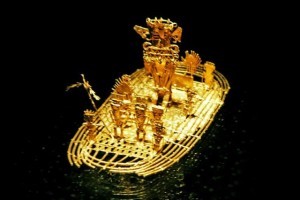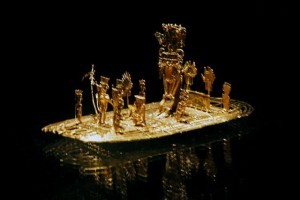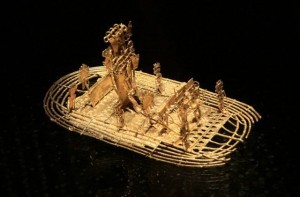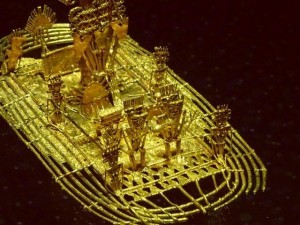The legend of El Dorado was born in the 16th century when the Spanish arrived in Muisca territory and spread rumors that there was a city of gold deep in the Colombian mountains. Since then, the myth of El Dorado has attracted explorers and treasure hunters into the mountains of South America.
Over the years, however, the real story behind the myth has been revealed, and El Dorado (The Golden One) was not a place, but a person.
(The origins of the legend lie in the story of a Muisca ritual)
The most representative symbol of the El Dorado myth is the Muisca Raft, an outstanding example of pre-Columbian gold votive discovered in a cave near Bogota in 1856. It belongs to the late period of the Muisca culture, sometime between 1200 and 1500 BC.
(As recent archaeological research confirms, El Dorado -the Golden One- was not a place, but a person)
The Muisca tribe is one out of four advanced civilizations of the Americas (apart from the Aztec, Mayas, and Incas), best known for their skilled gold working.
(Representation of the famous El Dorado ceremony, an initiation of the new zipa -ruler- in the lake of Guatavita)
The golden sculpture is made of an alloy of pure gold (over 80%) with native silver and a small amount of copper alloy by using the lost wax method and depicts the ceremony ritual of the new zipa (ruler) of Bacatá at the lake of Guatavita.
He is surrounded by other chiefs, all adorned with feathers, pendants, armlets, crowns, and earrings, carrying musical instruments, jaguar masks, and shaman maracas in their hands. The tribe members located at the edges seem to be oarsmen.
(Gold objects were not considered symbols of material wealth within Muisca society. They were used only for ceremonial and decorative purposes)
When a leader died within Muisca society, a new chief was acknowledged, usually the nephew of the previous chief, who used to cover his body in gold dust, and standing at the center of a raft, he offered treasures to the Guatavita goddess in the middle of the sacred lake. This old Muisca ceremony became the origin of the El Dorado legend.
The piece is now on display at the Gold Museum in Bogota and may be the key to the greatest treasure never found.
Ask me anything
Explore related questions









